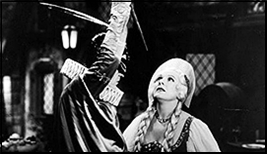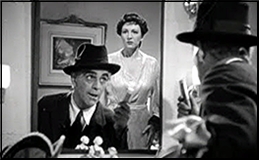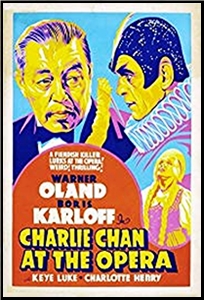Sun 23 Jun 2019
A Mystery Movie Review by Dan Stumpf: CHARLIE CHAN AT THE OPERA (1936).
Posted by Steve under Mystery movies , Reviews[3] Comments

CHARLIE CHAN AT THE OPERA. Fox, 1936. Warner Oland, Boris Karloff, Keye Luke, William Demarest, Charlotte Henry, Thomas Beck, Margaret Irving, Gregory Gaye, Nedda Harrigan, Frank Conroy and Guy Usher. Written by Scott Darling, Charles Belden and Bess Meredyth, based on the character created by Earl Derr Biggers. Directed by H. Bruce Humberstone. Libretto by Oscar Levant.
Above the title, the screen reads, “WARNER OLAND vs BORIS KARLOFFF†which is not exactly true of the ensuing film, but I remember it did pump considerable excitement into the monster-movie fan I was at 14, watching Charlie Chan at the Opera after school.

In the wisdom of my advancing years I can appreciate CCatO for the anomaly it is. Or was. In 1936 Horror movies were banned in Britain and began to disappear from American screens, not to return till Son of Frankenstein in 1939. In the interim, Karloff made only a handful of films, and in 1938 would find himself feebly competing with Oland in Monogram’s “Mr. Wong” series – “Warner Oland vs Boris Karloff†indeed!
But let’s get back to Charlie Chan at the Opera. It’s basically a Chan film trimmed out with some Horror Movie clichés — it even opens on a dark & stormy night!—and as such it shows off the strengths and weaknesses of Fox’s durable Chan series: strong production values and a capable supporting cast vs Oland’s tedious delivery, cardboard characters, and improbable story-line.
Karloff opens the film in bravura style as an escaped maniac on some sort of vendetta that leads him back to the Opera where he once starred, with murders ensuing. But since this is a Chan film, he can’t actually be the killer — a bitter disappointment to a young horror fan of my acquaintance.

Instead, we get the usual suspects: Margaret Irving, Geregory Gaye and Nedda Harrigan are rather good as the Nasty Diva, Philandering Baritone, and his Jealous Wife, but Charlotte Henry and Thomas Beck merely take up space as the perfunctory young lovers — there’s a momentary eyebrow-raiser when a bit of careless writing pegs Ms Henry’s age as about 11, but this isn’t that kind of movie; it’s the kind of movie where William Demarest plays the obligatory Dumb Cop on a single shrill note that gets tiresome very quickly.

Against this mediocrity, Karloff and his back story (Years ago his “widow,†now the Nasty Diva, locked him in his dressing room during a theater fire.) emerge with a full-blooded theatricality I still find highly enjoyable. When Karloff comes on as Mephisto, glowering and demonic, belting out his ersatz villainy at the top of his lungs, CCatO achieves an intensity that seems fittingly poetic. And it’s fun to watch, too.
I should add that this may be due in large measure to Oscar Levant’s mini-opera, with Karloff’s big scene reprised to haunting effect as he is lured back out onstage in an empty theater by the orchestra playing his big number. Levant was obviously having fun with this (I could swear I heard Karloff singing “Coloratura! ColoraTURRRAHHH!â€) but it makes a perfect showcase for the actor, the character, and a scene that, like many old horror films, is strikingly operatic.

June 23rd, 2019 at 8:52 pm
It certainly stand out from the rest of the series in terms of Karloff’s performance, the Levant opera, and the obvious production values.
June 24th, 2019 at 2:36 pm
This is one Charlie Chan film I haven’t seen, or if I have, it was so long ago I don’t remember it.
By sheer coincidence, though, in th epast week or so I’ve watched three Karloff films from the 1950s, and reviews of two of them will show up here soon. The third, a non-epic called FRANKENSTEIN 1970, was so forgettable that I didn’t manage to write a review of it before I forgot it.
It did have an interesting premise, though. The last descendant of the original Baron Frankenstein has fallen on such hard times that he’s rented out his mansion to a gang of movie people.
You’d think the story wold go on to something interesting from there, but it doesn’t.
June 25th, 2019 at 3:31 am
Oland, Karloff and Levant. Sounds very intriguing. Good job putting movie in context.